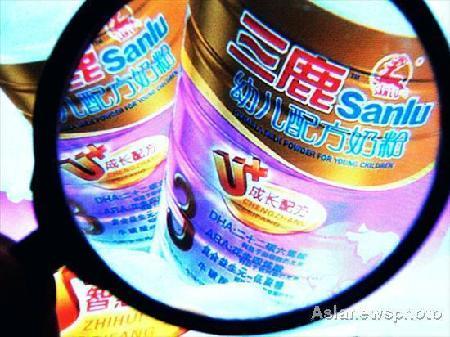
A lawsuit filed by a family that was a victim of the melamine-tainted milk scandal saw its day in court on Friday - the first trial for the families suing the milk company since the incident broke out more than one year ago.
Several courts nationwide have previously accepted compensation cases from parents of sickened children who were not satisfied with the government-led compensation, but no court has ever held a public hearing against the company until Friday.
Ma Xuexin, father of a 20-month-old boy from Henan province, requested compensation totaling 55,184 yuan ($8,080) from collapsed dairy maker Sanlu Group in Hebei province and a Beijing-based supermarket, where he bought the Sanlu-brand infant formula milk powder before the scandal went public last year.
The 30-year-old also requested that the medical costs for his son, until he reaches adulthood, be covered by the 1.1 billion yuan State-run compensation fund, of which 900 million was paid by Sanlu Group last December.
"Since my son was born last March, he has suffered from a stone in his left kidney after consuming hundreds of packages of Sanlu-brand infant formula milk powder," Ma said in the hearing.
The two defendants, the bankrupted Sanlu Group and the Longhua supermarket in the Shunyi district, both said they should not be held responsible for the plaintiff's requests because the central government has already set up the fund for victim families.
"There is no official document from the hospitals showing the direct link between melamine-tainted milk powder and the child's kidney problem," said Zhou Xiaolong, a lawyer with the Jimin Law Firm from Hebei province, where Sanlu Group was formerly located.
The hearing came just three days after two criminals were executed by injection in Hebei for their roles in producing and selling toxic milk, which killed six children and made more than 300,000 sick nationwide.
There was not a flurry of media attention at the hearing on Friday. Only representatives from the plaintiff and the defendants were sitting in the small No 9 courtroom at the Shunyi district court, about 30 km northeast of downtown Beijing.
"Being the first case held by a Chinese court, more such cases may have a chance to be heard in the near future," said Xu Zhiyong, a Beijing-based law scholar.
The hearing lasted just two hours without a verdict. The judge, Zhang Nan, said that both sides need to bring more evidence when the trial continues on Dec 9.





